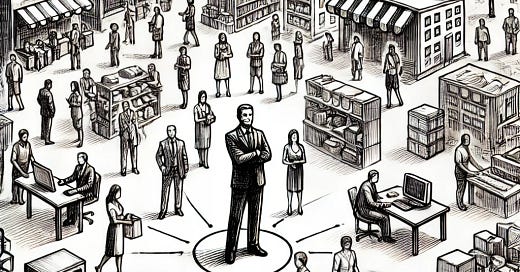Stakeholder Trust: The Underrated Long-Term Advantage
Why treating all stakeholders fairly can serve as a unique long term moat
Image from DALL-E
In business, it’s easy to treat stakeholders as boxes to be checked. But real success comes from viewing every participant as someone who matters. If you ignore a supplier because they’re small or delay payments to improve your cash flow, you’re making a withdrawal from your future value.
In the Philippines, I see this happening often. Companies with buying power promise suppliers 30-day terms but take six months or even a year to pay. Why? Because they can. They’re big enough that the suppliers can’t afford to push back. But this isn’t free. Every time a company squeezes a partner like that, it’s trading long-term trust for short-term cash flow. And that trade, if repeated enough, destroys the foundation of the business.
It’s the same logic that explains why doctors make patients wait. If you walk away, they don’t care—they have selling power. Another patient will take your place. But people remember how they’re treated. Trust is built in drops and lost in buckets.
This doesn’t just happen in the Philippines—it happens globally. Take Starbucks, for example. Starbucks used to be synonymous with the “third place” experience—a place people could linger between work and home. But when it shifted its focus to mobile orders and quick grab-and-go purchases, it sacrificed the in-store experience. Long wait times and chaotic drink orders became common. The result? A 16% drop in stock value, which equated to a $15 billion market value loss, as customers began questioning if Starbucks was still the same place they valued. The temptation of chasing quick wins in volume and sales undermined what made Starbucks unique.
Nike experienced a similar misstep with its suppliers. In the late 1990s and early 2000s, the company was plagued by reports of abusive labor practices in its supply chain, including child labor and sweatshop conditions. This tarnished Nike’s reputation to the point where its stock price plummeted by more than 50% in 1998 alone, costing the company billions in lost revenue and forcing it to spend a decade rebuilding its image. As Phil Knight, Nike’s founder, admitted, the company’s image had become synonymous with exploitation and abuse, a disaster for a brand that sold empowerment and performance. The financial impact wasn’t limited to sales losses—Nike had to overhaul its entire supply chain.
The worst part is that the people making these choices often don’t see the opportunity they’re missing. Treating stakeholders fairly isn’t just an ethical decision—it’s a strategic one. If you pay suppliers on time, they’ll prioritize you. Banks, seeing that your suppliers are happy, will view you as less risky. Investors trust businesses that treat everyone fairly. The effect compounds.
Imagine a company that treats all its stakeholders—customers, suppliers, employees, creditors—as genuine partners. That company has an invisible moat. Suppliers recommend it to their best customers. Banks introduce it to other investors. Investors point partners its way. It becomes an ecosystem where everyone benefits. And when something goes wrong, as it inevitably will, that company won’t have to face the problem alone. It will have built up reservoirs of trust.
Sometimes being in an environment where stakeholder sacrifices are all too common, habits are hard to break. This is why from now on, we made it a rule in our company that all suppliers must be paid on time, and any delays beyond what we promised will have severe consequences for those responsible. The same principle goes with our customers, investors, debtors and partners.
People think it’s unconventional to treat the weakest stakeholder fairly, but it’s just long-term thinking. It’s like paying off a debt that most people don’t even realize they owe. That’s because power dynamics are temporary. A supplier may be weak today, but tomorrow they might be crucial. A patient may be powerless now, but next year they’ll be deciding whether to recommend you. Companies that understand this aren’t just fair—they’re resilient.
So, the next time you’re tempted to stretch a payment or push a partner a bit too far, remember Starbucks and Nike’s experiences. You may win today’s battle, but you risk losing the war. Because the strength of a business isn’t measured by how it treats its most powerful stakeholders, but by how it treats its weakest.
ABOUT THE AUTHOR
Keenan Ugarte is Managing Partner at DayOne Capital Ventures, an independent private holding company based in the Philippines that partners with entrepreneurs across a wide range of industries. He is the Co-Founder and Director of The Independent Investor and Co-Founder of Cocopan.




